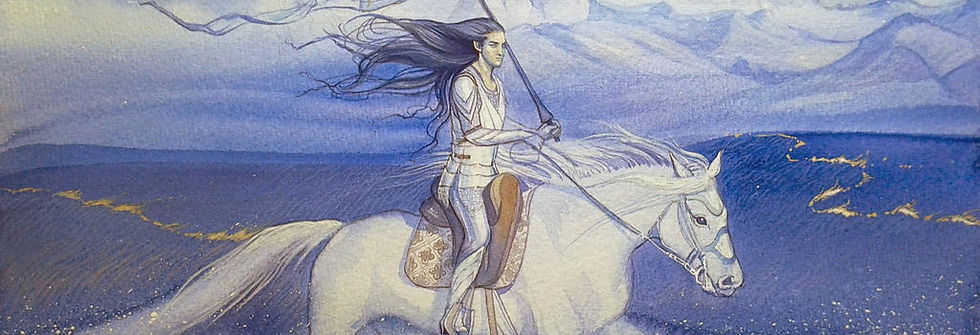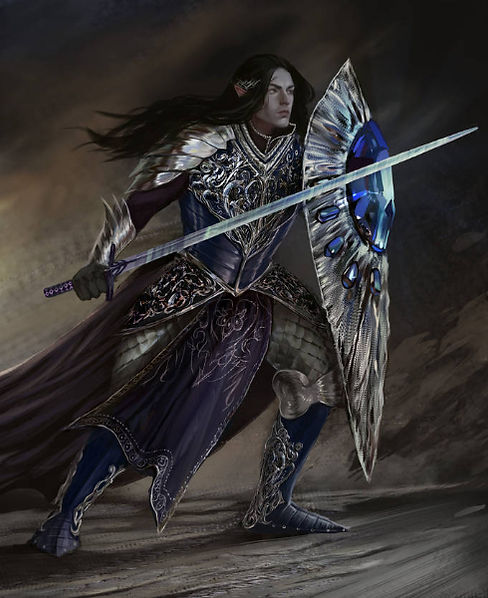Formenos

Fingolfin, by Kimberly80
Who was the strongest Eldar?
Given the near overwhelming evidence for Fëanor being the greatest and mightiest Eldar to ever live, this question is, in my opinion, always asked with the specific underhand purpose of teasing out the answer that Fingolfin is the strongest Eldar to ever live, and by strongest, the questioner obviously means physical strength.

It is this passage that always gets quoted:
The Silmarillion
Chapter 5 - Of Eldamar and the Princes of the Eldalië
"...Fëanor was the mightiest in skill of word and of hand, more learned than his brothers; his spirit burned as a flame. Fingolfin was the strongest, the most steadfast, and the most valiant. Finarfin was the fairest, and the most wise of heart..."
But given the text from Chapter 11:
Chapter 11 - Of the Sun and Moon and the Hiding of Valinor
"...For Fëanor was made the mightiest in all parts of body and mind, in valour, in endurance, in beauty, in understanding, in skill, in strength and in subtlety alike, of all the Children of Ilúvatar, and a bright flame was in him..."
Which text takes priority? Is this a case of a contradiction?
I don’t think so, because Chapter 11 clearly states that Fëanor is said to be the mightiest in "all parts of body and mind", and it then goes on to list many facets of body and mind, including "in strength". So, Fëanor is physically the strongest. End of story.
Fingolfin's Wrath, by Ted Nasmith
Additionally, when considering the sentence about Fingolfin, the other terms used to describe Fingolfin are steadfast or valiant. Which to my mind are clearly ones of character, not ones of physicality. And few would doubt that Fingolfin was clearly of better character than Fëanor. What is it to say one is steadfast or valiant? What do these words mean?
Steadfast - Resolutely or dutifully firm and unwavering.
Valiant - Possessing or showing courage or determination.
Tolkien, of course, knew what these words meant and would have used them carefully, and they are clearly statements about someone’s character, not their physical capabilities. So, I think it quite acceptable to take the position that in the same sentence where the term strongest is used, Tolkien was therefore talking about Fingolfin’s mental strength, strength of character, and strength of mental fortitude. And given the context the other terms bring; I believe it is up to others to argue away from this position. I believe an objective view can only conclude Tolkien is talking of Fingolfin's mental strength, not his physical strength.
Another reason many Fingolfin fans hang their argument that he is the strongest Eldar, is the fact that Fingolfin fought and wounded Morgoth, and that he was the only one to ever achieve that.
However, this is completely irrelevant. Who else among the Eldar had the chance to fight Morgoth? Finwë only, he was slain, and the combat was not detailed. Does anyone doubt that had Fëanor been at Formenos too, or had achieved the gates of Angband after landing in Middle-earth, that he would have been just as willing to call Morgoth out and have a ruck? Of course he would, and like Fingolfin, Fëanor would have died at Morgoth's hands.
Plus, Fingolfin’s combat with Morgoth is completely irrelevant because I think it is quite clear from the works that nothing short of an Ainur could have any hope of defeating Morgoth.

Fingolfin, by Bellaberglots
But the most compelling and incontrovertible evidence that Fingolfin is NOT the strongest, is the text that has already been quoted, from Chapter 11 of The Silmarillion.
Fëanor was physically the strongest Eldar. Fingolfin may well have been next, but he was not the strongest.
Star of Fëanor, by Kimberly80

Other Tolkien Articles
Glorfindel...the most powerful Elder ever?